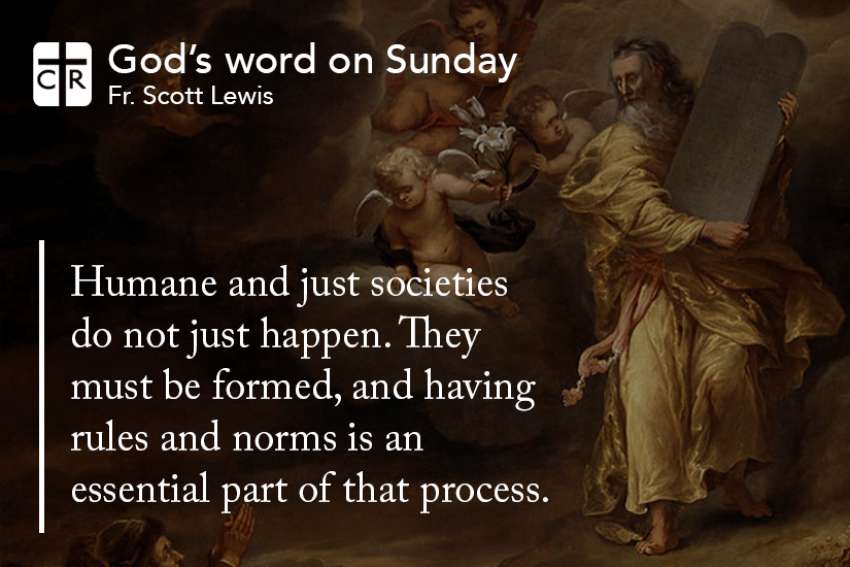Most people enjoy living in a society that is peaceful, safe, prosperous and relatively fair and just. Few people, however, like rules and norms — at least for themselves.
Humane and just societies do not just happen. They must be formed, and having rules and norms is an essential part of that process. When God made a covenant with the people of Israel, God immediately established the norms by which the people would live.
These were later amplified with more specific standards, covering all facets of human activity, from marriage and sexual relations to economic activity and criminal acts.
Not much slipped through the net! Rules did not have to be invented out of thin air — many of the principles in Old Testament laws were very similar to those of other ancient middle eastern cultures.
The Decalogue, or Ten Commandments, differs in that it demands complete and undivided devotion and loyalty to the God of Israel. This should not have been hard to do, for God reminded them of their rescue from slavery by the divine hand.
The other commandments are what we might expect — do not murder, commit adultery, lie, steal or bear false witness. Parents were to be honoured and cared for.
Slaves, foreigners and animals were included in the Sabbath rest. The Decalogue interwove these commandments, so necessary for the common good, with worship and fidelity to God.
Finally, aim was taken at the root cause of much human strife and injustice: jealousy and coveting what belongs to another. To desire what belongs to another — often merely because it does — destroys relationships, communities, societies and nations. The message was clear: don’t even start; root coveting and greed from your heart.
Many believe the commandments to be obsolete and of little use for the modern world. It is true that some of the language needs refashioning. We do not look on someone’s spouse as property and though we are often guilty of forms of idolatry, the way it is described means little in our own age. But with some minor modifications, the commandments are more needed now than ever before.
Societies and communities need rebuilding and revitalization. Respect for the rights of others and concern for the common good have both fallen on hard times. This pales in comparison to the way God has been marginalized in human lives, even among many religious people. The Decalogue is alive and well, and there are several inspiring commentaries on the Decalogue by Jewish authors excellent for spiritual reading and reflection.
Jesus — the real Jesus — has never been a big hit with those immersed and well-versed in the ways of the world.
A different Jesus is often more popular, a Jesus eager to defend one’s ideology, theology, personal opinions, prosperity, prejudices, intolerance or nationalism.
Better yet, a Jesus who will leave us alone to do whatever we want.
Paul preached a different Jesus: Christ crucified. The crucified Christ was a symbol of apparent weakness and failure but was really the wisdom and power of God.
Those who renounce competition, power, violence and the domination of others, will be thought weak and pitiable.
When this “weakness” is opened to God, it becomes the source of divine empowerment, bringing grace, healing and new life for others.
New Testament accounts are often told in different settings and places with a very different spin. In Matthew, Mark and Luke, the temple cleansing occurs at the end of Jesus’ ministry — His last public act. It is a warning of the temple’s destruction.
In John, the “cleansing” is placed at the beginning of Jesus’ ministry. Instead of a prophecy of doom, it admonishes people not to traffic and profit on the faith of people, a warning that is always timely and needed.
When Jesus offered as a sign His ability to raise the temple up in three days, the authorities interpreted this in a literal — and unbelievable — manner.
Most people misunderstand spiritual teachings, for literalism is often the enemy of enlightenment. The narrator explained that Jesus was speaking of the temple of His body.
Written well after the temple’s destruction, this account focused the encounter with the divine not in a physical building, but in Christ Himself. Jesus is the temple of God and so are we, to the extent that we abide in Him.


